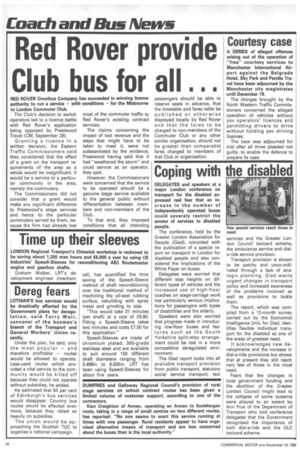Coping with the disabled
Page 22

If you've noticed an error in this article please click here to report it so we can fix it.
DELEGATES and speakers at a major London conference on transport for the disabled expressed real fear that an increase in the number of independently operated buses could severely restrict the access of services to disabled people.
The conference, held by the Greater London Association for Deople (Glad), coincided with the publication of a special report on transport in London for disabled people and also considered the implications of the White Paper on buses.
Delegates were worried that different step heights on different types of vehicles and the increased use of high-floor coaches on stage-carriage work has particularly serious implications for passengers with types of disabilities and the elderly.
Speakers were also worried that progress made in introducing low-floor buses and featu res such as the South Yorkshire split-step arrangement could be lost in a more competitive deregulated environment.
The Glad report looks into all available transport provision from public transport, statutory social service transport, taxi services and the Greater London Council taxicard scheme, the ambulance service and diala-ride service provision.
Transport provision is shown to be patchy and unco-ordinated through a lack of strategic planning. Glad wants urgent changes in transport policy and increased awareness of the problems involved as well as provisions to tackle them.
The report, which was compiled from a 12-month survey carried out by the Economist Intelligence Unit, for Glad, identifies flexible individual transport for the disabled as one of the areas of greatest need.
It acknowledges new developments and the increase in dial-a-ride provisions but shows that at present they still reach very few of those in the most need.
Fears that the changes in local government funding and the abolition of the Greater London Council might lead to the collapse of some systems were allayed to an extent by Ann Frye of the Department of Transport who told conference delegates that the Government recognised the importance of both dial-a-ride and the GLC taxicard scheme.




































































































